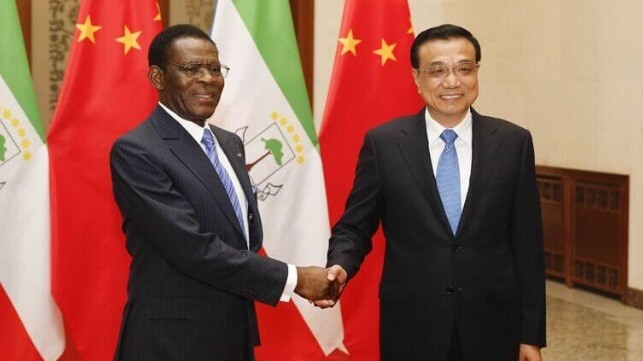Why Equatorial Guinea May Host China’s First Atlantic Naval Base

Since mid-2021, U.S. defense officials have warned that China is considering whether to build a naval base in the Central African nation of Equatorial Guinea. If built, it would be China’s second such facility in Africa and its first in the Atlantic.
Although China’s sea power is predominantly based in the Pacific, its ambitions are growing. Last year, Gen. Stephen Townsend, head of U.S. Africa Command, warned of China’s dalliance with the government of Equatorial Guinea. According to Townsend, other African nations with a coastline along the Atlantic are also on China’s list of prospects to establish a naval port. These include Mauritania and Namibia.
“They’re looking for a place where they can rearm and repair warships. That becomes militarily useful in conflict,” said Townsend.
He added that a Chinese naval base in the Atlantic would be unsettling for US military interests, considering the relatively short distance between Africa’s West Coast and the U.S East Coast. A Chinese base in Africa’s northern Atlantic Coast could be its closest to U.S national waters.
Classified intelligence reports revealed by The Wall Street Journal last month shed more light on the proposed Chinese military base in Equatorial Guinea.
“In Equatorial Guinea, the Chinese likely have an eye on Bata. Bata already has a Chinese-built deep-water commercial port on the Gulf of Guinea, and excellent highways link the city to Gabon and the interior of Central Africa,” said a U.S government official.
Bata is the largest city in the mainland section of Equatorial Guinea, while the capital Malabo is located on the island of Bioko. Within the mainland city is the Port of Bata, one of the country’s largest ports.
With modern facilities and two long commercial piers (530 meters and 550 meters), it can easily handle any People’s Liberation Army Navy (PLAN) combat vessels. Additionally, the Port is situated adjacent to an oil facility, making it favorable for refueling operations. It also has an extensive warehouse area and intermodal yard, which would be useful for re-supply operations.
Bata has greatly benefitted from China-Equatorial Guinea trade deals spanning over five decades. In 2006, the Export- Import Bank of China provided an initial round of funding for the construction of the Port of Bata, which was built by a subsidiary of the state-owned China Communications Construction Company in 2014. Another state-owned enterprise (SOE), the China Road and Bridge Corporation, has carried out other successive developments at the port. Huawei Marine Networks also operates in the country, and in 2015, it was awarded a contract by the Equatorial Guinean government to connect its submarine cable system into a wider network that extends as far as Europe.
In a 2020 U.S Defense Department Annual report to Congress, the Pentagon predicted that China would be adding military facilities along the African Atlantic coastline in the next 15 years. Due to the large amount of oil and liquefied natural gas exported out of West and Central Africa, it makes the region a high priority zone for China.

that matters most
Get the latest maritime news delivered to your inbox daily.
“Any effort by Beijing to get a naval port on the Atlantic Coast would be an expansion of China’s military presence. But the desire for ocean access may be primarily for economic gain, rather than military capabilities,” said Henry Tugendhat, a senior policy analyst with the United States Institute of Peace.
Meanwhile, China has been reinforcing the capacity of its first overseas naval base in Djibouti. Last year, construction of a new pier capable of receiving an aircraft carrier was completed. The base also hosts more than 2,000 military personnel, including hundreds of marines ready to be deployed for security missions in the Horn of Africa and Indian Ocean territories.
